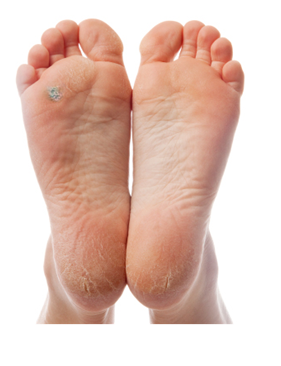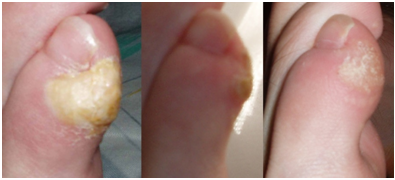These are thick, hardened layers of skin that develop when your skin tries to protect itself against friction and pressure. The area could have single or multiple corns.. Since repeated contact is required, calluses are most often found on feet because of frequent walking.
Calluses are generally not harmful, but may sometimes lead to other problems, such as skin ulceration or infection.However, if you have diabetes or another condition that causes poor circulation to your feet, you're at greater risk of complications from corns and calluses.
Signs & Symptoms:
You may have a corn or callus if you notice:
- A thick, rough area of skin
- A hardened, raised bump
- Tenderness or pain under your skin
- Flaky, dry or waxy skin
Corns and calluses are often confused, but they're not the same thing:
- Corns are smaller than calluses and have a hard center surrounded by inflamed skin. Corns tend to develop on parts of your feet that don't bear weight, such as the tops and sides of your toes, though they can also be found in weight-bearing areas. Corns can even develop between your toes. Corns can be painful when pressed.
- Calluses usually develop on the soles of your feet, especially under the heels or balls, on your palms, or on your knees. Calluses are rarely painful and vary in size and shape, though they're often larger than corns.
Causes:
Pressure and friction from repetitive actions cause corns and calluses to develop and grow. Some causes include:
- Ill-fitting shoes. When shoes are too tight or have high heels, they compress areas of your foot. When they're too loose, your foot may repeatedly slide and rub against the shoe. Your foot may also rub against a poorly placed seam or stitch inside the shoe.
- Skipping socks. Wearing shoes and sandals without socks can lead to friction on your feet. Socks that don't fit properly also can be a problem.
- Using hand tools. Calluses on your hands may result from the repeated pressure of using tools on the job, around the house or in the garden.

Homoeopathy for Corn:
The conventional method of treating corns involves surgical removal. But this is not a permanent solution, as corns recur frequently. Nor does it prevent more corns from forming in the same or other areas. Pedicures and home remedies like cutting or trimming corns with a sharp instrument, aggravates the condition and can result in unnecessary injury.
Homeopathy, on the other hand, offers a safe and long-term remedy. Not only does it sidestep a painful and expensive procedure, but it assures a permanent cure. Corns do not recur once treated successfully with homeopathy.
